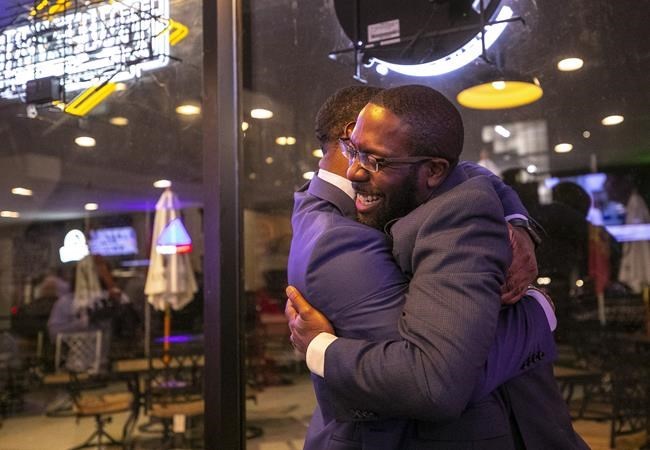IOWA CITY, Iowa (AP) — Voters in Iowa's eighth-largest city, Waterloo, reelected the city's first Black mayor and chose three Black candidates for City Council, which will have its Black majority for the first time ever.
The historic outcome of Tuesday's election followed a campaign marked by over policing and race in the city, where less than 17% of roughly 67,300 people are Black.
Quentin Hart, who became Waterloo’s first Black mayor in 2015, won a fourth two-year term to lead the city by defeating a white challenger, Margaret Klein, who campaigned as a champion of the police.
The four City Council seats that were on the ballot were won by three Black newcomers — pharmacist Rob Nichols, music educator John Chiles and artist Nia Wilder — and a white incumbent, Ray Feuss. All four defeated candidates that were endorsed by Cedar Valley Backs the Blue, a political action committee that formed in May to oppose Hart’s reelection and support what it called “pro-law enforcement candidates.”
The outcome means four of the council's seven members will be Black and it could help the city's first Black police chief, Joel Fitzgerald, keep the job he assumed last year. Fitzgerald faced criticism and calls to resign from Klein, who was also backed by the pro-police group.
Critics accused the group of using misinformation and racist campaign tactics to falsely paint Hart as an opponent of law enforcement who was allowing crime to spiral out of control.
“This community chose working together, a message of unity, a message of hope and a message that is love for the city and not just division,” Hart said told The Associated Press by phone on Wednesday, acknowledging that the campaign took a toll on him and his family.
Hart said he and his supporters celebrated Tuesday by dancing to the Montell Jordan song “This is How We Do It,” which featured prominently in one of the many attacks he faced. The mayor last year made a video of himself lip-syncing the song for a local contest, and the “Back the Blue” group used the clip in Facebook ads to criticize Hart as a wannabe rapper.
Growing up in Waterloo, Hart said he never saw a day when Black people would make up a majority of city leadership, calling it “incredible” and “landmark.” But he said the candidates won because of their qualifications and a vision for the city that appealed to voters across racial and economic lines.
“Yes they are African Americans, but they are incredible, smart and talented, and they have something to offer to the city. The expectations are high,” Hart said.
Hart won 58% of the vote against Klein out of 13,400 ballots cast. Klein, a retired Catholic school worker and two-term City Council member, congratulated Hart and noted that her campaign had been outspent significantly.
Lynn Moeller, the chairman of the “Back the Blue” group, did not immediately respond to a message seeking comment. On Facebook, the normally outspoken group wrote only that the voters had spoken and it was “time to move forward.”
The group, which was formed by retired officers, criticized the city’s decision to remove the police department’s longtime emblem — a mythical winged creature known as a griffin that had adorned officers' uniforms since the 1960s.
Critics said the emblem had long evoked fear and distrust in the Black community given its resemblance to a Ku Klux Klan dragon. Those who wanted to keep the emblem, including the police union, said it was a symbol of vigilance and not rooted in racism.
The group also argued that morale among officers was at an all-time low, noting that some had resigned to take other jobs and blaming Fitzgerald, who previously served as the police chief in Fort Worth, Texas. Since taking the Waterloo job, Fitzgerald has changed many department policies in an effort to improve relations between the police and the community and to hold officers to higher standards. Fitzgerald called the attacks racially-motivated.
Hart defended Fitzgerald, saying the department has adopted a popular community policing approach that promotes “decency and respect” during traffic stops.
Nichols, one of the newly elected council members, wrote on his campaign website that he saw himself in the many Black men who have been shot by police and that he once feared making a late-night medication delivery to a patient out of fear of trouble.
“My vision for public safety is for all people of Waterloo to know that our public safety service will be there in our time of need,” he wrote.
Ryan J. Foley, The Associated Press




